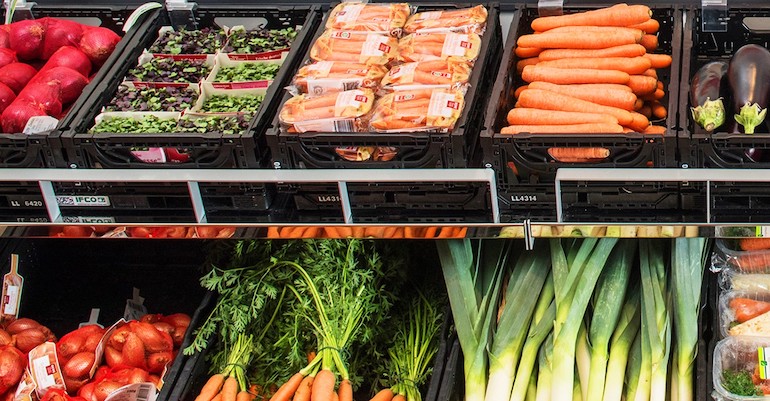Wakefern adopts reusable plastic containers for fresh produceWakefern adopts reusable plastic containers for fresh produce
Partnerships with RPC manufacturers to help reduce food and plastic waste
August 13, 2021

Wakefern Food Corp. aims to cut food and plastic waste in store produce departments through the use of reusable plastic containers (RPCs).
The Keasbey, N.J.-based grocery retail cooperative, whose supermarket banners include ShopRite, said Thursday that it has partnered with IFCO Systems, Tosca and other companies that specialize in RPCs to improve the quality and sustainability of fresh fruit and vegetables as well as lower costs for shoppers.
RPCs provide more effective product protection and temperature control, in turn maximizing supply chain efficiency, according to Wakefern. The containers’ highly ventilated, foldable and sturdy designs bring improved freshness and save time, space and money for shippers. And in warehouses, RPCs offer better storage and handling of produce via efficient stacking and integration with automated processes, resulting in less potential food loss and waste versus conventional single-use packaging, the company noted.
Compared with single-use packaging, RPCs generate less carbon dioxide and solid waste and require less energy and less water to manufacture, Wakefern reported. Citing data from the Plastics Industry Association, the cooperative said RPCs and recycled plastic products use 66% less energy than comparable items made with raw plastic material.
“Adopting reusable RPCs is a win for our customers, our suppliers, the environment and Wakefern,” Robert Zuehlke, manager of corporate social responsibility at Wakefern, said in a statement. “Wakefern is focused on engaging vendors whose products help drive a more sustainable future by reducing the environmental impacts of packaging, food waste and greenhouse gas emissions.”

Compared with single-use packaging, RPCs like Tosca's provide more effective produce protection and temperature control, Wakefern said.
The use of RPCs dovetails with current waste reduction and sustainability initiatives at Wakefern and its retail stores. Wakefern’s recycling center has processed more than 2.6 million tons of material since opening in the late 1970s, and in 2020 the cooperative’s stores recycled 128,648 tons of waxed and corrugated cardboard, 421 tons of newspaper, 132 tons of office paper and 38 tons of metal. ShopRite also composted over 8,200 tons of food waste at stores.
On the consumer side, late last year ShopRite rolled out own-brand products with a special How2Recycle label developed by the Sustainable Packaging Coalition. The label informs customers how to properly dispose of all product packaging parts and components. Items bearing the How2Recycle include Paperbird paper goods and home cleaning products and Bowl & Basket food and dairy products.
The nation’s largest retailer-owned cooperative, Wakefern has a network of 362 supermarkets in New Jersey, New York, Connecticut, Pennsylvania, Maryland, Delaware, Massachusetts, New Hampshire and Rhode Island under the ShopRite, Price Rite Marketplace, The Fresh Grocer, Dearborn Market, Gourmet Garage and Fairway Market banners. ShopRite’s nearly 280 stores are located in New Jersey, New York, Pennsylvania, Connecticut, Delaware and Maryland.
Read more about:
TargetAbout the Author
You May Also Like



.webp?width=300&auto=webp&quality=80&disable=upscale)


